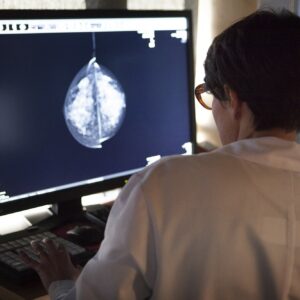
NYU Langone Health today announced a new at-home service for transcranial direct current stimulation (tDCS)—a type of noninvasive brain stimulation—currently available to patients in almost every state.
The first program of its kind, NYU Langone’s tDCS Program provides virtual treatment for a range of cognitive, motor, speech, or mood symptoms that can occur in an array of neurological and psychiatric conditions. tDCS has been extensively studied for use in treating symptoms related to multiple sclerosis (MS), movement disorders, and recovery from stroke, and as treatment for depression and fatigue. There also is early indication that tDCS treatment may help with recovery following a coronavirus disease (COVID-19) infection.
“Many individuals with neurological and psychiatric disorders have difficulty leaving the house because of their condition,” says Leigh E. Charvet, PhD, professor in the Department of Neurology, who leads MS-related tDCS research at NYU Langone. “This virtual program brings the latest treatments directly to our patients, enabling us to reach more people.”
Patients enrolled in the tDCS Program connect to the video visits using the free NYU Langone Health app. They wear an electrode headset that applies a low-grade electric current on the scalp, which makes it easier for neurons to fire. Patients also may perform a series of therapeutic activities during the stimulation session at the direction of their provider.
“We create a personalized care plan for each patient that supports their individual needs and goals,” says Charvet. “Treatment can include activities like seated motor exercises or playing cognitive training computer games.”
The program is provided as innovative care, and as such, is not currently covered by insurance; however, NYU Langone’s tDCS treatment packages bring the cost to approximately $30 per session, including the equipment rental. The service also is participating in a clinical trial for the use of tDCS in treatment-resistant depression, which reduces the cost for patients who are eligible to enroll.
Annamarie Prono, a Queens resident who has had MS for 29 years and is a past participant in several MS-related tDCS clinical trials at NYU Langone, enrolled in the virtual tDCS Program after she began dropping small household items due to her condition.
“The tDCS Program has helped me regain control of my daily self-care routines,” says Prono. “It’s incredible to see how far MS care has come since I was first diagnosed. Now there are treatment options available that not only prevent disease progression, but improve quality of life.”
“This innovative treatment provides many individuals with relief, often after other options haven’t been successful,” says Charvet. “Several post-COVID-19 patients also have experienced improvement with tDCS, which may help speed recovery from their persisting symptoms.”
New Jersey resident Nomi Colton-Max has noticed a 70 percent improvement in the debilitating COVID-19 symptoms she suffered from for nearly a year within weeks of starting the tDCS Program. “I’ve finally started walking my dog again, cooking meals for my family, and I don’t need to nap as often after strenuous activities,” says Colton-Max. “Even my remote colleagues have commented on my recent recovery.”
Source: Company Press Release



